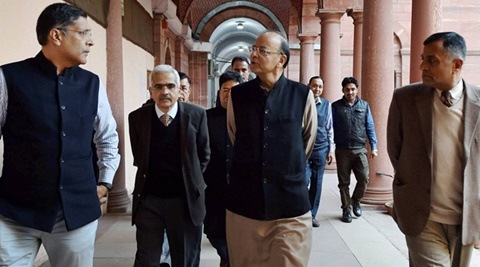The demonetisation decision announced by Prime Minister Narendra Modi on November 8, 2016 had four declared objectives: a) curb corruption, b) stop counterfeiting c) stop use of high-value notes for terror activities, d) end accumulation of “black money”. The decision, however, sparked outrage from the opposition, leading many to demonize the Prime Minister.
However, the government continues to maintain that demonetisation would bring long-term gains for the country and yes, there will be short-term negative effects on the economy. The Economic Survey 2016-17 released on Tuesday provides a philosophical basis for demonetisation and argues how it is indeed a necessary “radical”, historic” decision with “profound” impact on the India Economy.
“India’s demonetisation is unprecedented in international economic history, in that it combined secrecy and suddenness amidst normal economic and political conditions,” it says.
“In fact, India has given a whole new expression to unconventional monetary policy, with the difference that whereas advanced economies have focused on expanding the money supply, India’s demonetisation has reduced it. This policy could be considered a “reverse helicopter drop”, or perhaps more accurately a “helicopter hoover”, it adds.
The Survey says demonetisation “represents” a structural break from the past. Hence it stays clear from making a lot of prediction and says “forecasting its impact is hazardous.”
The Survey clearly outlines the short-term and long-term effects of demonetisaion. Some of them have already been acknowledged by global bodies like the World Bank and IMF recently.
Here’s what the Survey says about the possible long-term effects of demonetisation
- Cash will recover but settle at a lower level
- Deposits will decline, but probably settle at a slightly higher level
- RBI’s balance sheet will shrink, after the deadline for redeeming outstanding notes
- Loan rates could fall further, if much of the deposit increase proves durable Increase, to the extent that the cash deposit ratio falls permanently.
- Corruption could decline if incentives for compliance improve
- Black money: Formalization should reduce the flow of unaccounted income
- Private wealth : It may fall further if real estate prices continue to decline
- Public sector wealth: Government/RBI’s wealth will increase when unreturned cash is extinguished, reducing liabilities
- Real estate: Prices could fall further as investing undeclared income in real estate becomes more difficult; but tax component could rise, especially if GST imposed on real estate.
- GDP: Note ban could be beneficial in the long run if formalization increases and corruption falls.
- Tax Collection: Indirect and corporate taxes could decline, to the extent growth slows. In the long run, taxes should increase as formalization expands
On predictions that India’s GDP would fall sharply, the Survey says, “Over the medium run, the implementation of GST, follow-up to demonetization and other structural reform measures should take the trend rate of growth of the economy to the 8-10 percent range that India needs.”
The Survey says the GDP growth in the second half of the financial year 2016-17 will “understate the overall impact because the most affected parts of the economy — informal and cashbased — are either not captured in the national
income accounts or to the extent they are, their measurement is based on formal sector indicators.”
LIVE: Watch CEA @arvindsubraman speaking on Universal Basic Income, #UBI pic.twitter.com/iAcl2oUDw6
— PIB India (@PIB_India) January 31, 2017
The Survey, however, also mentions the condition in which demonetisation may fail — that is if the cash couldn’t be substituted with other forms of money, or if India resists a shift to the cashless economy.
“Demonetization will afford an interesting natural experiment on the substitutability between cash and other forms of money. Demonetization has driven a sharp and dramatic wedge in the supply of these two: if cash and other forms are substitutable, the impact will be relatively muted; if, on the other hand, cash is not substitutable the impact will be greater,” it says.


